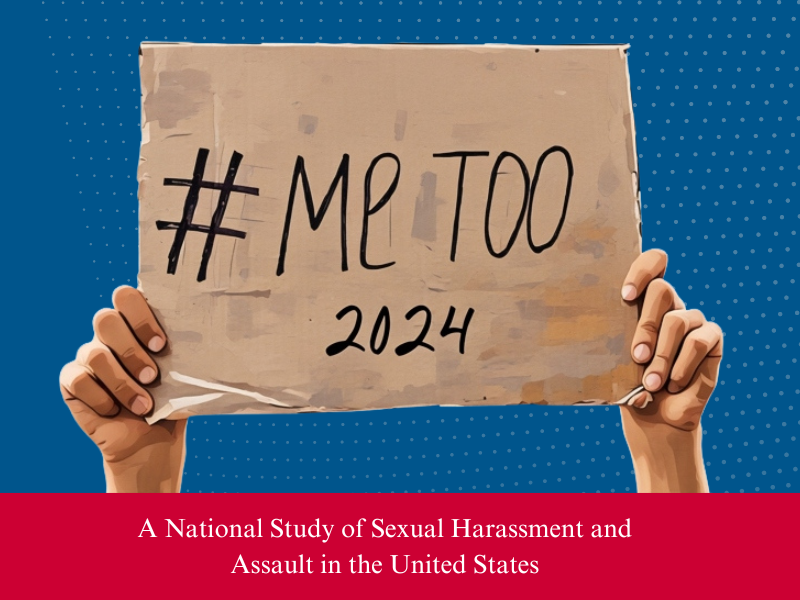
In both 2018 and 2024, Dr. Raj led a nationwide survey research on sexual harassment and assault in the United States, known as the #MeToo Survey. This work provides the most comprehensive statistics on sexual harassment available for the United States and includes assessment of sexual harassment and assault in public spaces and in the workplace. In 2018, we also included a California #MeToo Survey, and in 2024, we included state #MeToo Surveys for California, Louisiana, Mississippi, and Texas. The original 2018 #MeToo Survey found that over 80% of women in the United States have experienced sexual harassment, with these experiences most often occurring in public spaces and perpetrated by strangers. We also found that more than one-third of women in the United States has experienced sexual harassment in the workplace. Sexual assault, in contrast, is more likely to occur in private spaces and perpetrated by a partner, friend, or acquaintance. Findings from the 2018 #MeToo Survey were featured by the New York Times and other media outlets.
#METOO HARASSMENT PROJECT METHODS AND TRANSPARENCY 2024
Survey Questions* #MeToo Harassment Study 2024
Sexual Harassment and Assault in Louisiana: Findings from the #MeToo 2024 Survey
Sexual Harassment and Assault in Texas: Findings from the #MeToo 2024 Survey
Sexual Harassment and Assault in Mississippi: Findings from the #MeToo 2024 Survey
Sexual Harassment and Assault in California: Findings from the #MeToo 2024 Survey
Biased Beliefs May Be Impeding U.S. Women’s Progress in Political Leadership
- Supported By: Newcomb Institute, with additional funding support from Stop Street Harassment, Valor, Raliance, and private donations.
- Project Contact: Anita Raj (Care of Laura Kreller) lkreller@tulane.edu
- Media Contact: Stacey Plaisance, sjenkins5@tulane.edu
Principal Investigator

Anita Raj, PhD, MS she/her/hers
Executive Director, Newcomb Institute of Tulane University
Nancy Reeves Dreux Endowed Chair
Professor, Tulane School of Public Health and Tropical Medicine
araj@tulane.edu
Acknowledgements
We would like to thank the National Opinion Research Center (NORC) at the University of Chicago for their work leading survey implementation and data management. We also want to thank our partner organizations: Stop Street Harassment, dedicated to data and policy solutions to stop street sexual harassment, Valor, a national organization committed to advancing equity and ending sexual violence, and Raliance, which empowers industries, sectors, and systems to create organizational cultures free from sexual harassment, misconduct, and abuse. We are grateful to Becky Gipson of Newcomb Institute for her design of this report and all report-related materials from this study, Nicole Johns of Center on Gender Equity and Health at UC San Diego for her support with survey data and analysis, and research intern Charna Skolnick of American University for her review of sexual harassment and assault policies to provide us with background for this report. We also wish to thank David Lee of Valor and Tori Vandelinde of Raliance for their role as advisors for this work. Finally, and most importantly, we would like to thank the participants of this study for sharing their time and information with us.
Note: This report covers sensitive information related to sexual harassment, assault, and mental health.
If you or someone you know needs support for these issues, these resources may be helpful:
• National Emotional Crisis and Suicide Hotline 9-8-8
• National Sexual Assault Hotline 1-800-656-4673
• National Domestic Violence Hotline 1-800-799-7233
• National Street Harassment Hotline 1-855-897-5910
